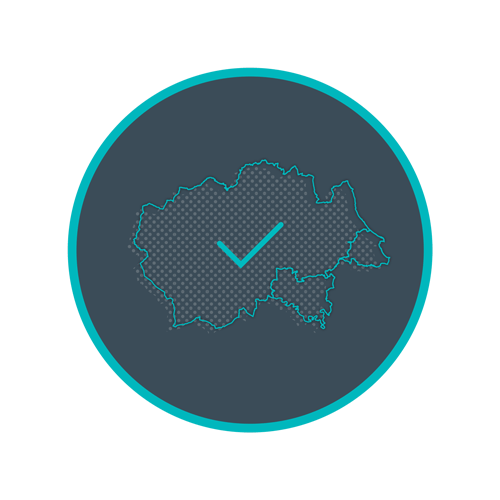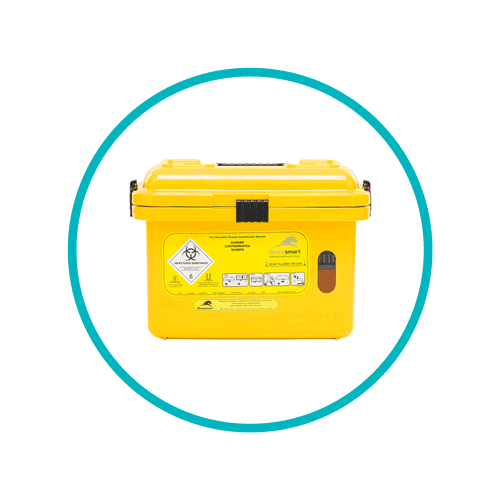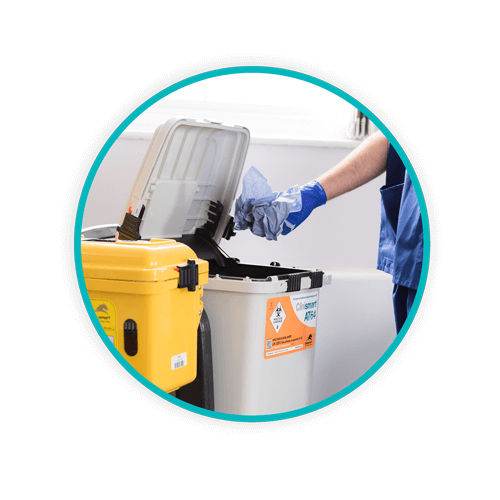Healthcare Waste Management Guidelines for Durham

Durham is located in northeast England and is home to the St. Cuthbert Cathedral, designated in 1986 as a World Heritage Site by UNESCO. Durham is also home to Durham University, founded in 1832, as well as numerous hospitals and healthcare facilities within the Country Durham and Darlington NHS Foundation Trust.
Additional healthcare centres, outpatient clinics, dental and veterinary services are located throughout Durham and surrounding communities. Every one of these facilities generates some type of healthcare waste. Knowledge of healthcare waste management guidelines for Durham is important not only for the safety of healthcare providers, but patients, the general public, and the environment.
TOPICS WE WILL COVER:
1 / Healthcare waste management in Durham
3 / Health waste classifications
5 / Documentation ensures compliance
6 / Containing healthcare waste
7 / Sharpsmart resources for compliance
Healthcare waste management in Durham
All healthcare facilities, regardless of size or location in Durham, should take the time to review the UK Department of Health’s Health Technical Memorandum 07-01: Safe Management of Healthcare Waste. This document is downloadable and contains vast stores of information that can help maintain compliance. 
It is the duty of care of every healthcare waste generator in Durham and throughout the UK to be aware of the regulations and standards for not only waste segregation processes, but storage, labelling, transportation, and disposal of healthcare waste.
Waste stream segregation is the first step toward proper management of healthcare waste. Every staff member should know the difference between infectious and non-infectious wastes, as well as the difference between hazardous and non-hazardous wastes. Ability to properly identify, categorise, and segregate waste streams within a facility ensures safe and compliant practices.
It is important to not only know and understand Department of Health guidelines, but the guidelines for Durham regarding waste management processes. Local, county, and country-wide guidelines must all be followed for compliance.
While the Health Technical Memorandum covers a wide variety of facilities – including research centres and laboratories, community healthcare centres, community pharmacies, general practices and health centres as well as dental practices – it’s also important to check with local authorities and agencies to ensure that local town and city requirements for proper waste disposal are also observed.
Healthcare waste management is essential to ensure that waste is handled, stored, treated, and safely disposed of. However, definitions and methods may differ slightly across the UK. Healthcare waste management practices are also recommended for businesses such as care homes, alternative healthcare services and even tattoo parlors, body art businesses, and beauty salons. Every one of these facilities are required to follow regulations for compliant segregation, storage, and disposal of healthcare waste.
About waste codes
Government websites publish statutory guidance for accurate documentation and labelling when it comes to waste codes. The Environment Agency also provides statutory guidance for any healthcare waste generator in regard to their duty of care and ensuring that such generators meet all requirements. Statutory guidance for Waste Duty of Care: Code of Practice is an excellent resource.
According to the waste duty of care, standards apply to “anyone who imports, produces, carries, keeps, treats, disposes of, or are a dealer or broker that has control of, controlled waste.” As such, a waste holder can be a waste producer, a carrier, or broker (such as an agency that collects, transports, or disposes of controlled waste).
Any facility that generates hazardous waste must ensure compliance with hazardous waste regulations and associated consignments. Hazardous waste disposal processes must be handled, stored, and transported in a way that ensures no damage or harm to those dealing with that waste.
It is also important that waste be classified accurately through use of proper colour-coding, labelling, and packaging processes. Carriage regulations must also be followed. European Waste Codes (EWC) are applicable to healthcare and other similar wastes from municipal sources. Chapter 4 of the Health Technical Memorandum covers healthcare waste definitions and classifications as well as covering the difference between hazardous and non-hazardous clinical waste and other waste streams.
Health waste classification
Healthcare waste classification involves assessment of the waste. In order to determine this, healthcare waste must be properly identified by the waste producer at the time of generation or production for medicinal, chemical, and/or infectious properties.
EWC codes are assigned dependent on the waste source as well as the presence of chemicals including but not limited to, cytotoxic and cytostatic medicines. For example:
- 18 01 08 is classified as cytotoxic and cytostatic human medicines
-
18 01 09 is classified as medicines other than those mentioned in 18 01 08
A number of differences in codes are also applicable when it comes to clinical or non-clinical waste. For example, Chapter 4 (4.52) in the Health Technical Memorandum states that “if the chemical is not a dangerous substance or is not present in the waste or waste item in sufficient concentration to generate a hazardous property, it will not result in the waste being classified as clinical waste.”
Sharpsmart realises that understanding the technicalities found not only in the Health Technical Memorandum but on government websites in regard to classification, segregation, and packaging and storage recommendations for different waste streams can be confusing. For this reason, it is important to reach out to local as well as government agencies for clarification and guidance.
Sharps waste 
Sharps waste disposal processes must be compliant to the rules of the Control of Substances Hazardous to Health regulations (COSHH) not only in Durham, but throughout England and the UK. Proper colour-coding, storage, and minimisation of such waste is recommended. Another important reference is the Health and Safety Executive document – Sharps Instruments and Healthcare Regulations 2013.
Use of compliant containers and their structure and placement requirements, adequate employee training, and proper disposal and labelling recommendations are required for all types of healthcare facilities, including residential care homes, pharmacies, hospitals, and outpatient centres.
Documentation ensures compliance
In Durham and other cities and counties throughout the UK, written documentation is essential to ensure compliance and reduce the risk of fines and penalties for improper healthcare waste management and disposal. Such documentation is essential when waste is transported off-site. Hazardous wastes must be listed on a hazardous waste consignment note. Non-hazardous waste does not require a hazardous waste consignment note, but will require a waste transfer note.
Containing healthcare waste 
Every waste stream must be bagged or contained in properly coloured bags, containers, or bins. Such waste must be marked and tagged to ensure proper and legible documentation of the type of waste contained within. Generator information must also be included to ensure that any waste that leaves the facility can also be traced back to its source. This is especially important when infectious or potentially biohazardous or toxic waste is transferred from one location to another.
Sharpsmart resources for compliance
Sharpsmart provides products, resources, education, and services for all types of healthcare facilities in Durham and throughout the UK. It is our goal to ensure not only safety for healthcare providers, the public, and the environment, but to reduce the volume of healthcare waste that is treated through carbon intensive processes. Contact Sharpsmart today to ensure that your facility is compliant with up-to-date regulations regarding healthcare waste management.
